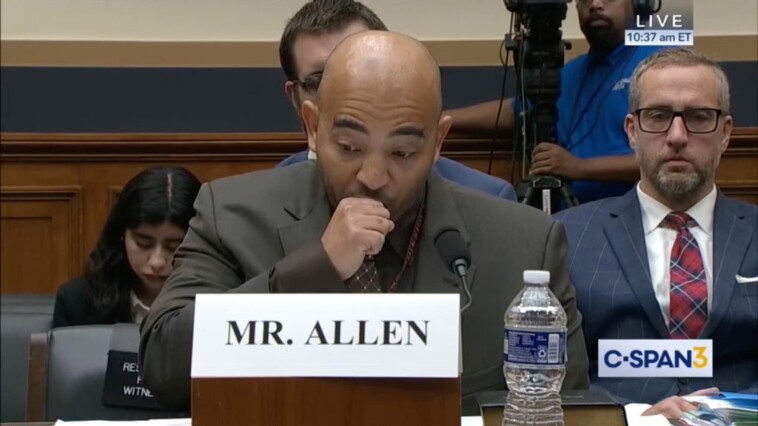A former FBI staff operations specialist choked up Wednesday as he told lawmakers on Capitol Hill about his years of suffering for lawfully expressing dissent — one of many retaliatory actions deemed “highly inappropriate” by the Justice Department’s inspector general.
Marcus Allen, whose attorneys reached a settlement with the bureau earlier this year, told the Judiciary Subcommittee on Weaponization of the Federal Government that higher-ups “accused me of promoting conspiratorial views and unreliable information” for questioning how many confidential informants were present at the Jan. 6, 2021, Capitol riot.
“The FBI questioned my allegiance to the United States, suspended my security clearance, suspended my pay and refused to allow me to obtain outside employment or even accept charity,” Allen testified about the 27 months he was held in “indefinite limbo.”
“There are no words strong enough to describe the impact the FBI’s lies about me have had on me and my family,” he went on, becoming emotional. “The stress has taken a toll on our health and our children have suffered, traumatized by the thought of our door getting kicked in or Dad not coming home.”
A devout Catholic, Allen said he was even forced to take early withdrawals from a retirement account to make mortgage payments for his family home.
“Despite the stress and uncertainty, I’ve never once regretted standing up for truth,” added the former G-man and Marine Corps veteran, his voice quavering. “Indeed, my family and I persevered due to our strength in faith, God’s grace and the sacraments.”
“What we have gained spiritually has far outweighed what was lost materially,” he told committee members, later revealing that the bureau has yet to pay out his settlement money.
The accusations against Allen stemmed from a Sept. 29, 2021, email that he forwarded to supervisors and colleagues at the Charlotte Field Office, which included hyperlinks to what was later flagged as “extremist propaganda” from “questionable sources.”
Allen sent the links to highlight what he believed was not “forthright” testimony by FBI Director Christopher Wray about confidential human sources not being at the Capitol during the “Stop the Steal” rally thrown by former President Donald Trump.
His belief was buttressed by reporting that originated in the New York Times and included links to other well-known political news sites like the polling aggregator RealClearPolitics.
Ex-FBI Washington Field Office Assistant Director in Charge Steven D’Antuono confirmed last year in testimony to the full House Judiciary Committee that the bureau even lost count of the total confidential informants on the ground that day.
Allen testified alongside his attorney, Tristan Leavitt, president of the whistleblower legal nonprofit Empower Oversight, and Department of Justice Inspector General Michael Horowitz.
Both were able to discuss Allen’s case since he had waived his privacy rights after regaining his security clearance and winning back pay in the June settlement, making him the only former spook to overcome the suspension of a security clearance.
“No employee should suffer reprisal for bringing forward information that they reasonably believe is evidence of waste, fraud, abuse or a violation of law,” Horowitz said in his opening remarks before laying out the allegations that he is investigating related to the FBI’s security clearance investigation and adjudication process.
Those claims include “highly inappropriate questions being asked of witnesses during the security clearance investigations” — including political conservatives who were seen as loyal to Trump or resistant to COVID-19 vaccine mandates — and at least one case of a clearance being revoked “based on race.”
“These allegations raise serious issues, and I would note do not apply to only a subset of employees with certain political views or ideologies,” Horowitz added, vowing he was seeking “to ensure that the security clearance investigation and adjudication is never used against whistleblowers” again.
Leavitt’s legal nonprofit is repping three current FBI employees who took issue with the bureau’s treatment of Marcus during his security clearance investigation.
“Two of them also suffered reprisal from the FBI for trying to treat him fairly,” the Empower Oversight president testified. “In fact, the entire leadership of the Division’s Clearance Adjudication Unit was removed in September 2023, apparently in reprisal for standing up to improper direction from leadership.”
Leavitt also name-checked FBI Miami Field Office Special Agent in Charge Jeffrey Veltri, who was allegedly investigated for retaliating against whistleblowers using the security clearance process, often “based on political views and personal medical decisions.”
Veltri, who is currently overseeing the FBI investigation into the second assassination attempt on Trump earlier this month, also mocked Allen as “delusional” for being motivated by his sincerely held religious beliefs to question Wray’s testimony about the Capitol riot.
Allen rebuked Veltri in his testimony, saying: “You can insult me, but you should not mock God.”
Horowitz, under questioning from Judiciary Chairman Jim Jordan (R-Ohio), also called the attack on Allen’s spiritual outlook “very concerning.”
Allen’s case is one of dozens reviewed by Horowitz earlier this year as part of a probe into the FBI’s retaliation via the security clearance process.
At least 106 agents were suspended for an average of almost 18 months with the state of their security clearance and future employment in doubt, according to data released in May by Horowitz’s office.
“It is my opinion that the bureau used reprisal and fear to control the workforce,” Allen said in his closing remarks. “I welcome the work of the IG, but I think [with] any type of lawless action, there’s no legitimate timeframe to rein them back in.”
“Their ability to overclassify information,” he added, “can allow them to stonewall forever.”








